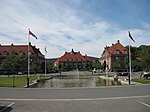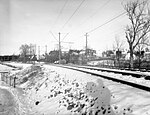Norwegian Geotechnical Institute
Norwegian Geotechnical Institute (Norwegian: Norges geotekniske institutt, NGI) is an independent international centre for research and consultancy in engineering-related geosciences, integrating geotechnical, geological and geophysical expertise. NGI is a national centre for geotechnical research and development. The research and development is conductet within geotechnics and associated disciplines create results in the form of new expertise, new methods and new technology, with expertise within material properties, modelling and analysis, and instrumentation and monitoring. NGI's strength lies in the expertise of its personnel working in collaboration with clients and partners.NGI is also the host of the International Centre for Geohazards (ICG), one of Norway's first Centres of Excellence (CoE). NGI's partners are NORSAR, the Norwegian Geological Survey (NGU), the University of Oslo (UiO) and the Norwegian University of Science and Technology (NTNU).
Excerpt from the Wikipedia article Norwegian Geotechnical Institute (License: CC BY-SA 3.0, Authors).Norwegian Geotechnical Institute
Sognsveien, Oslo Nordre Aker
Geographical coordinates (GPS) Address Nearby Places Show on map
Geographical coordinates (GPS)
| Latitude | Longitude |
|---|---|
| N 59.9486 ° | E 10.731 ° |
Address
Sognsveien 72
0855 Oslo, Nordre Aker
Norway
Open on Google Maps








